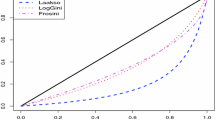Abstract
In sample surveys where people are asked to express their personal opinions it is conceivable to register a high level of indecision among respondents and this circumstance generates sub-optimal statistical analyses caused by large heterogeneity in the responses. In this paper, we discuss a model belonging to the class of generalized cub models which is worthwhile for this kind of surveys. Then, we examine some real case studies where the observed heterogeneity and the subjects’ indecision can be analyzed with the proposed approach leading to convincing interpretations. A comparison with more consolidated models and some concluding remarks end the paper.









Similar content being viewed by others
References
Abela, A.: Solidarity and religion in the European Union: a comparative sociological perspective. In: Xuereb, P. (ed.) The Value(s) of a Constitution for Europe, pp. 71–101. European Documentation and Research Centre, University of Malta, Malta (2004)
Agresti, A.: Analysis of Ordinal Categorical Data, 2nd edn. Wiley, Hoboken (2010)
Alesina, A., Di Tella, R., MacCulloch, R.: Inequality and happiness: are Europeans and Americans different? J. Public Econ. 88, 2009–2042 (2004)
Bailey, K., West, R., Anderson, C.A.: The influence of video games on social, cognitive, and affective information processing. In: Decety, J., Cacioppo, J.T. (eds.) The Oxford Handbook of Social Neuroscience. Oxford University Press, Oxford (2012). doi:10.1093/oxfordhb/9780195342161.013.0066
Blanchflower, D., Oswald, A.: Well-being over time in Britain and the USA. J. Public Econ. 88, 1359–1386 (2004)
Bruni, L.: Reciprocity, Altruism and the Civil Society. Routledge, London (2008)
Corduas, M., Iannario, M., Piccolo, D.: A class of statistical models for evaluating services and performances. In: Bini, M., et al. (eds.) Statistical Methods for the Evaluation of Educational Services and Quality of Products. Contribution to Statistics, pp. 99–117. Physica-Verlag, Berlin (2009)
Cugnata, F., Salini, S.: Model-based approach for importance-performance analysis. Qual. Quant. 48, 3053–3064 (2014)
D’Elia, A., Piccolo, D.: A mixture model for preference data analysis. Comput. Stat. Data Anal. 49, 917–934 (2005)
Gadrich, T., Bashkansky, E., Zitickis, R.: Assessing variation: a unifying approach for all scales of measurement. Qual. Quant. 49, 1145–1167 (2015)
Gehrlein, W.V., Plassmann, F.: A comparison of theoretical and empirical evaluations of the Borda Compromise. Soc. Choice Welf. 43, 747–772 (2014)
Gehrlein, W.V., Lepelley, D., Moyouwou, I.: Voters’ preference diversity, concepts of agreement and Condorcet’s paradox. Qual. Quant. 49, 2345–2368 (2015)
Gini, C.: Variabilità e mutabilità. Studi economico-giuridici, Facoltà di Giurisprudenza, Universitàdi Cagliari, A, III, parte II (1912)
Greene, W.H.: Some Accounting for Excess Zeros and Sample Selection in Poisson and Negative Binomial Regression Models. Working Paper EC-94-10, Department of Economics, New York University (1994)
Grofman, B., Uhlaner, C.: Metapreferences and reasons for stability in social choice: thoughts on broadening and clarifying the debate. Theory Decis. 19, 31–50 (1985)
Guttman, L.: A basis for scaling qualitative data. Am. Soc. Rev. 9, 139–150 (1944)
Hall, D.B.: Zero-inflated poisson and binomial regression with random effects: a case study. Biometrics 56, 1030–1039 (2000)
Iannario, M.: Modelling shelter choices in a class of mixture models for ordinal responses. Stat. Methods Appl. 21, 1–22 (2012)
Iannario, M., Piccolo, D.: CUB models: statistical methods and empirical evidence. In: Kenett, R.S., Salini, S. (eds.) Modern Analysis of Customer Surveys: With Applications Using R, pp. 231–258. Wiley, Chichester (2012a)
Iannario, M., Piccolo, D.: A framework for modelling ordinal data in rating surveys. In: Proceedings of Joint Statistical Meetings, Section on Statistics in Marketing. San Diego, California, pp. 3308–3322 (2012b)
Iannario, M., Piccolo, D., Simone, R.: CUB: A class of mixture models for ordinal data. R package version 0.1. http://CRAN.R-project.org/package=CUB (2015)
Kakvani, N., Khandker, S., Son, H.H.: Pro-poor growth: concepts and measurement with country case studies. International Poverty Center Working Paper, 2004-1, Brasil (2007)
Kankaras, M., Moors, G.: Heterogeneity in solidarity attitudes in Europe. Insights from a multiple-group latentclass factor approach. IRISS Working Papers, 2007-06 (2007)
Laakso, M., Taagepera, R.: Effective number of parties: a measure with application to West Europe. Comp. Polit. Stud. 12, 3–27 (1989)
Lambert, D.: Zero-inflated poisson regression, with an application to defects in manufacturing. Technometrics 34, 1–14 (1992)
Lloyd, C.J.: Statistical Analysis of Categorical Data. Wiley, New York (1999)
Manisera, M., Zuccolotto, P.: Modelling “Don’t know” responses in rating scales. Pattern Recogn. Lett. 45, 226–234 (2014b)
McCullagh, P.: Regression models for ordinal data (with discussion). J. R. Stat. Soc. Ser. B 42, 109–142 (1980)
McCullagh, P., Nelder, J.A.: Generalized Linear Models, 2nd edn. Chapman & Hall, London (1989)
Molenberghs, G., Verbeke, G.: Likelihood ratio, score, and Wald tests in a constrained parameter space. Am. Stat. 61, 22–27 (2007)
Moors, G.: Facts and artifacts in the comparison of attitudes among ethnic minorities. A multigroup latent class structure model with adjustment for response style behavior. Eur. Sociol. Rev. 20, 303–320 (2004)
Moors, G.: Exploring the effect of a middle response category on response style in attitude measurement. Qual. Quant. 42, 779–794 (2008)
Piccolo, D.: On the moments of a mixture of uniform and shifted binomial random variables. Quad. Stat. 5, 85–104 (2003)
Ravallion, M.: Pro-poor growth: a primer. Policy Research Working Paper, WPS3242, March. World Bank, Washington DC. (2004)
Stevens, S.S.: On the theory of scales of measurement. Science 103, 677–680 (1946)
Self, S.G., Liang, K.Y.: Asymptotic properties of maximum likelihood estimators and likelihood ratio test under nonstandard conditions. J. Am. Stat. Assoc. 82, 605–610 (2003)
Trezzini, B.: A measure of multidimensional polarization for categorical diversity data. Qual. Quant. 47, 313–333 (2013)
Tutz, G.: Regression for Categorical Data. Cambridge University Press, Cambridge (2012)
Vu, H.T.V., Zhou, S.: Generalization of likelihood ratio tests under nonstandard conditions. Ann Stat. 25, 897–916 (1997)
Wu, H.-H., Shieh, J.-I.: Quantifying uncertainty in applying importance-performance analysis. Qual. Quant. 44, 997–1003 (2010)
Author information
Authors and Affiliations
Corresponding author
Additional information
This work has been partially supported by FIRB2012 project at University of Perugia (code RBFR12SHVV) and the frame of Programme STAR (CUP E68C13000020003) at University of Naples Federico II, financially supported by UniNA and Compagnia di San Paolo.
Rights and permissions
About this article
Cite this article
Capecchi, S., Piccolo, D. Dealing with heterogeneity in ordinal responses. Qual Quant 51, 2375–2393 (2017). https://doi.org/10.1007/s11135-016-0393-3
Published:
Issue Date:
DOI: https://doi.org/10.1007/s11135-016-0393-3




